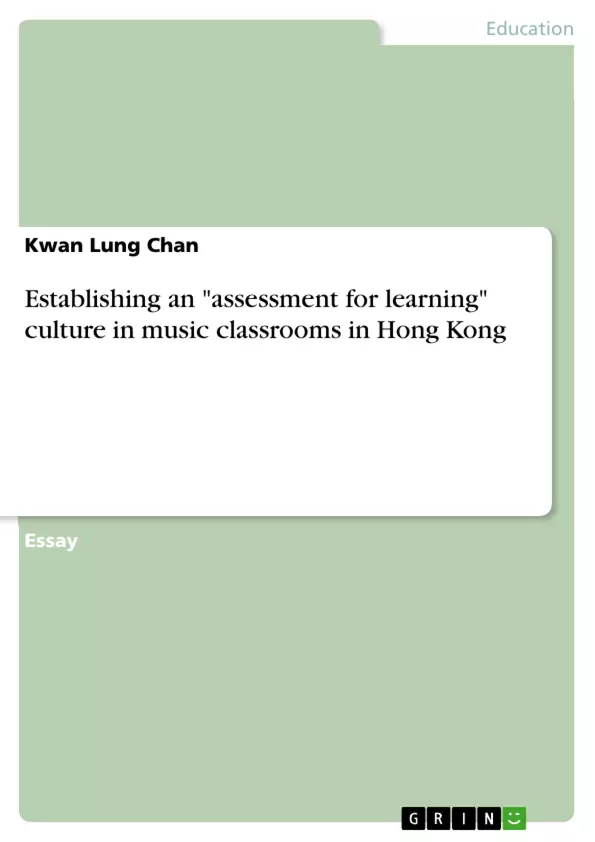The focus of assessment for learning is to diagnose learning problems, as opposed to the measuring of students' attainment in assessment of learning. Assessment for learning involves two processes. First, teachers get evidence about students’ learning. Second, they analyze the evidence to locate where the students are in learning and how they should take their next steps.
This essay will discuss what mechanism is suitable for assessment for learning in the music classroom, including in getting evidence, locating levels and substantial follow-up work.
Inhaltsverzeichnis (Table of Contents)
- Introduction
- Getting evidence: Guided group teaching
- Locating levels: Teaching pairs
- Locating levels: Identifying errors
- Follow-up work: Feedback
- Follow-up work: Differentiation in contents
- Follow-up work: Differentiation in cues
- Conclusion
- Reference
Zielsetzung und Themenschwerpunkte (Objectives and Key Themes)
This essay explores the implementation of "assessment for learning" within a music classroom setting in Hong Kong. The aim is to identify effective mechanisms for diagnosing learning difficulties and guiding student development, as opposed to solely measuring attainment. The essay focuses on the practical application of assessment for learning, examining methods for obtaining evidence, identifying individual learning levels, and providing relevant feedback and differentiation strategies.
- Assessment for learning in music education
- Effective mechanisms for gathering evidence of student learning
- Strategies for identifying individual student learning levels
- The importance of feedback in guiding student improvement
- Differentiation strategies for addressing diverse student needs
Zusammenfassung der Kapitel (Chapter Summaries)
- Introduction: This chapter introduces the concept of assessment for learning and its emphasis on diagnosing learning problems. It outlines the two core processes involved: gathering evidence and analyzing that evidence to identify students' learning levels and next steps.
- Getting evidence: Guided group teaching: This chapter discusses the use of guided group teaching as a method for collecting evidence of student learning. It highlights the benefits of group discussions in identifying individual strengths, weaknesses, and learning patterns.
- Locating levels: Teaching pairs: This chapter presents the concept of teaching pairs as a means of locating individual student learning levels. By having students retell and teach each other what they have learned, teachers can identify specific areas where students are struggling.
- Locating levels: Identifying errors: This chapter explores the identification of errors as a way to locate learning levels. The chapter advocates for the systematic coding of errors to understand student strengths, weaknesses, progress, and the nature of errors.
- Follow-up work: Feedback: This chapter emphasizes the importance of providing feedback to students to guide their improvement. It outlines various types of feedback, including feedback about the task, processing, self-regulation, and the self as a person.
- Follow-up work: Differentiation in contents: This chapter explores the concept of content differentiation to cater to diverse student needs. It discusses how music education can effectively use this approach given the varying levels of technical difficulty across musical instruments.
Schlüsselwörter (Keywords)
The essay focuses on the implementation of "assessment for learning" within a music classroom context. Key themes include guided group teaching, teaching pairs, error analysis, feedback, content differentiation, and student learning levels. It also highlights the importance of identifying student strengths, weaknesses, and learning patterns to provide effective instruction and support student development in the music classroom.
Frequently Asked Questions
What is the difference between "assessment for learning" and "assessment of learning"?
Assessment for learning focuses on diagnosing learning problems to guide progress, while assessment of learning measures student attainment at a specific point.
How can guided group teaching help in music classrooms?
It allows teachers to gather evidence of learning by observing individual strengths and weaknesses during group discussions and collaborative tasks.
What are "teaching pairs" in the context of learning levels?
Teaching pairs involve students teaching each other what they have learned, which helps teachers identify exactly where a student's understanding might be lacking.
Why is error identification crucial for music students?
Systematic error identification allows teachers to understand the nature of student mistakes and provide targeted instruction to improve technical skills.
What role does feedback play in assessment for learning?
Effective feedback guides students on how to improve their tasks, self-regulation, and learning processes, rather than just providing a grade.
- Citation du texte
- Bachelor of Education (Music) Kwan Lung Chan (Auteur), 2015, Establishing an "assessment for learning" culture in music classrooms in Hong Kong, Munich, GRIN Verlag, https://www.grin.com/document/448145



